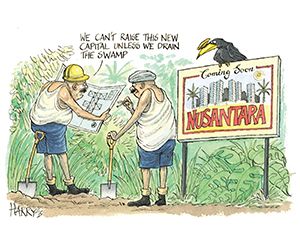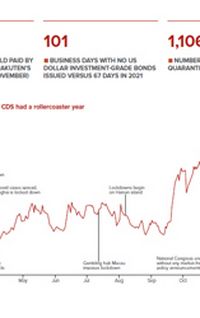As Indonesia’s president Joko Widodo comes to the end of his term, his focus will be on securing the future of the country’s planned new capital city, which may yet be a triumph of sustainability, but risks to his legacy remain in a febrile market environment.
![]()
In anticipation of its centenary, the government of Indonesia in 2019 unveiled “The Vision of Indonesia 2045” which set goals to become an advanced, prosperous and fair country by that date, along the lines laid out in the United Nations’ Sustainable Development Goals.
While the aim of becoming a fully developed nation by 2045 might look to cynics as an example of time-washing, the vision exemplifies the grand legacy ambitions long harboured by President Joko Widodo. The president, known by his nickname of Jokowi, has been in office for over eight years and his term is scheduled to end in August 2024.
Infrastructure has been key to his ambitions, together with enhancing regulatory oversight, fiscal prudence and industrial transformation. The latter comes with an increased focus on ESG inputs: appropriate given Indonesia’s status as one of the world’s biggest greenhouse gas emitters.
Indonesia made a symbolic statement of intent in the ESG stakes in 2018 when it brought Asia’s first sovereign green bond via a US$1.25bn five-year sukuk. That coincided with the announcement by Jokowi of a pledge to cut emissions 29% by 2030 and for renewable energy to account for 25% of Indonesia’s energy mix by 2025 along with a reduction in the use of dirty coal for energy generation.
That focus on decarbonisation has continued, with Indonesia signing a deal during the G20 summit in Bali in November 2022 to decommission several coal-fired power plants early under the Asian Development Bank’s energy transition mechanism.
The recent establishment of the green industrial area in Bulangan, North Kalimantan, as well as the plan to relocate Indonesia’s capital from Jakarta to Nusantara – a plan that makes sense given that the current capital is fast sinking because of depleted groundwater and rising sea levels – to be built according to environmentally friendly, sustainable criteria illustrate Jokowi’s alignment with the ESG zeitgeist.
“Jokowi’s administration has given some level of confidence to international stakeholders on Indonesia’s capability to maintain macroeconomic stability and economic prospects in the medium term in the midst of challenging geopolitical dynamics and the global economic slowdown,” said Billy Anugerah, head of South-East Asia investments at SC Lowy in Singapore.
Still, questions remain about the reality on the ground, and Indonesia’s ability to transform from a high-risk credit proposition mired in byzantine legal process and vested interests to a model of low-risk transparency anchored in international best practice and fully aligned with sustainability objectives.
One thing Jokowi will be hoping to avoid is a full-scale banking crisis during the last days on his watch which would shine a light on the failure to amend Indonesia’s arcane bankruptcy laws, unchanged as they are from the days of the Asian financial crisis of the late 1990s.
It is relatively easy for a creditor to initiate bankruptcy proceedings against a debtor under Indonesia’s PKPU court-supervised process. There is no minimum debt amount nor a restriction on the number of times a creditor can file. At the same time, local courts do not recognise foreign court judgments related to default, making offshore debt restructurings arduous. Jokowi has long pledged to reduce red tape and streamline the legal process – the bankruptcy laws would be a good place to start if he is thinking about his legacy.
Distressed loans
The portents are cause for concern: Indonesian banks are saddled with around US$44bn of distressed loans, according to the Financial Services Authority (Otoritas Jasa Keuangan, or OJK), many made during the height of the Covid-19 pandemic. Banks are rushing to get them off the books before a government forbearance programme expires in March 2024, having been extended for another year for certain sectors.
“Rising interest rates have had a significant impact on debt servicing for Indonesian corporates, and particularly issuers rated in the low high-yield space – B category and below – have seen financing costs jump, and market access severely weakened,” said Hasira de Silva, senior director in Fitch’s APAC corporates team.
“Default risk has risen substantially, and is likely to persist in the next 12 months to the extent market access remains prohibitively expensive. Domestic banks have taken on a more prominent role against the above backdrop with some issuers using bank financing to repurchase bonds off the market to reduce refinancing pressure.”
In October Fitch downgraded industrial estate developer Jababeka and its US$300m 6.5% 2023 bonds to CC from B– on refinancing risks despite the borrower having received a US$100m loan from Bank Mandiri. In December it convinced holders of around 89% of the notes to participate in an exchange offer and consent solicitation exercise, pushing the maturity out to 2027 and easing pressure on the company.
As well as the bond markets, the offshore loan markets are a locus of distress, with several syndicated US dollar loans having entered restructuring, including those for garment makers Sri Rejeki Isman and Pan Brothers.
“The OJK has been requiring banks to increase their reserves and provisions in preparation against post-forbearance bad debt and uncertainties in 2023. The question is really whether or not these reserves will be enough to weather the actual slowdown in the economy. We expect some banks will be more active in engaging in non-performing loan sales as one of their recovery options in 2023,” said Anugerah.
Much will depend on market sentiment in what promises to be a febrile year for financial markets, underpinned by rising policy rates in the US, transmitted to Asia largely via a bid to retain yield premiums and avoid capital flight. While inflation remains relatively low for Indonesia, its 5.5% reading for December was higher than Bank Indonesia’s 2%–4% target.
Stronger regulation
During Jokowi’s tenure regulation under the aegis of the OJK has become more forceful and convincing. It will be strengthened further under the Financial Sector Development and Reinforcement Law, ratified last December, which runs to 27 chapters and 341 articles and which will incorporate the substance of 17 existing laws which have previously regulated the financial services sector.
Additions include the regulation of digital assets and cryptocurrencies – including the central bank’s planned digital currency – and Bank Indonesia’s remit to purchase government securities (SBN) during times of financial crisis.
“OJK’s role is expanding because of its ability to establish broad recommendations and industry-specific regulations. The enactment of the financial sector omnibus law should also be seen as a breakthrough policy from the Jokowi administration which will put OJK in a commanding position,” said Dedi Dinarto, lead Indonesia analyst at public policy advisory firm Global Counsel in Singapore.
Meanwhile, it would be true to say that Indonesia’s attempts to follow the fast-unfolding ESG script have, at least on paper, improved the transparency of the country’s corporate reporting.
The Indonesia Stock Exchange (IDX) has implemented a variety of sustainable finance initiatives, including joining in April 2019 the Sustainable Stock Exchanges forum in a bid to improve corporate transparency in relation to ESG factors. In December, it launched the ESG Leaders index, to complement the SRI-KEHATI index launched in 2009, both of which aim to boost performance in relation to sustainability targets for listed companies. It has also collaborated with Sustainalytics to provide listed companies with ESG scores, and issued Rule 1-8 which incentivises the issuance of green bonds via listing fee discounts.
The IDX has yet to implement guidelines requiring a minimum proportion of women on boards, perhaps perpetuating the received opinion that corporate Indonesia resembles a boys’ club. Time will tell, but the ESG wheels are at least turning.
Indeed, the Nusantara project in East Kalimantan, some 1,000km north of Jakarta, has the potential to become Indonesia’s grand sustainability showcase, ticking all the boxes across the ESG spectrum, from circular economy to just transition to biodiversity.
With a price tag set by the government at US$34bn and all construction of residential, institutional and commercial buildings to be completed according to “strict, environmentally friendly … methods,” according to a government website, the project sounds like a project financier’s dream.
However, market rumours suggest it has failed so far to gain firm commitments from sponsors against Jokowi’s confident claim made last December that the project is 25 times “oversubscribed”.
Only Malaysia has so far stepped up, with newly installed Prime Minister Anwar Ibrahim bringing letters of intent from 10 Malaysian companies, including electricity company Tenaga Nasional and Boustead Properties, on his visit to Jakarta in January. If other countries follow Jokowi’s sales pitch for Nusantara made at the G20 summit he may well secure his greatest legacy for Indonesia.
To see the digital version of this report, please click here
To purchase printed copies or a PDF, please email shahid.hamid@lseg.com
















